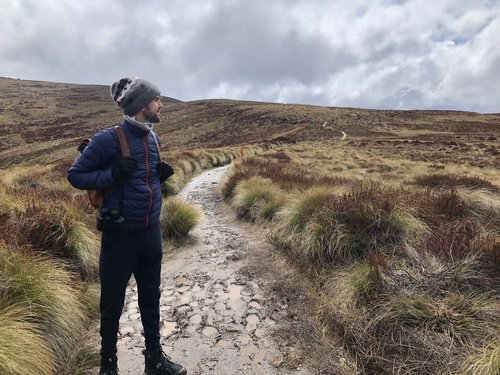The Struggles are real but so are the Strothers, Part One

I discovered new people yesterday – new to me, at least. One was a Strother and the other a Struggles. I learned a bit from both, which makes me glad. At 62, I realize that if I can continue to learn a little daily, it is proof of life in the pudding of relevance.
If I can continue to learn a little daily, it is proof of life in the pudding of relevance.
Matthew Strother and the Examined Life

I don’t know if there is a kinship between the late Matthew Strother and me but I don’t see how there couldn’t be. As far as I can tell, if you go back far enough – even as far as the 1400s – you will find almost all of the Strothers have Scots-English roots in Northumberland, England.
Matthew Strother died in 2023. I regret that I learned of the man posthumously because he is an intriguing character, an intellect with a thirst for examining life’s meaning through literature and philosophy. He and his wife Berta imagined establishing a different kind of school“¦
The Matthew Strother Center for The Examined Life will be a refuge for individuals who seek to live the life of the mind and, to adapt the words of Keats, become a soul. It will provide the space, time, and companionship to consider, as Matthew wrote, “who you are going to be in the world, not what.”
Consider who you are going to be in the world, not what.
Matthew Strother
Matthew Strother was born in 1987, which means he is younger than my two older daughters and only a couple of years older than my baby. His was a short but impactful life, at least for those who knew him best.
In writing about him, his friend and teacher, Bill Deresiewicz, and author and former Yale professor, wrote:
Matthew Strother was many things, but, above all, he was a seeker.
I first met Matthew when he walked into my English class at Yale in the spring of his sophomore year. He wasn’t there to get a good grade. He was there because he believed, as he would later put it, that what’s at stake when you read a book is nothing less than life itself.
MatthewStrother lived by that conviction. Ideas, for him, were instruments of salvation: guides to life that were also to be tested against life.
Matthew returned to New York to do a masters in Liberal Studies at The New School. His thesis, which took up the notion of Bildung in Nietzsche, Dilthey, and Gadamer, was a first attempt to answer the question that became his grail: how to restore a sense of meaning, of existential weight, to higher education. Like many of my best and most serious students, he despaired at the dearth of formal opportunities to live the life of the mind after college””and during it, as well. “It’s hard to build your soul,” as he put it to me, “when everyone around you is trying to sell theirs”.
It’s hard to build your soul when everyone around you is trying to sell theirs.
Matthew Strother
This is not an endorsement of Matthew Strother or his philosophy of life. I did not know the man and have only scraped the surface of his short but impactful life.
This is an endorsement of living intentionally and unconventionally. This is an endorsement of becoming a seeker of truth, relevance, and meaning.
The One whose life I fully endorse and seek to emulate, Jesus Christ the Messiah endorsed seeking and was a seeker of people whose way was lost.
You will seek me and find me, when you seek me with all your heart.
-Jeremiah 29:131
For the Son of Man came to seek and to save the lost.
-Luke 19:102
A Life Worth Living
The thing I like best about the name of the foundation Matthew’s wife and friends established is that they didn’t stop at “The Matthew Strother Center.” They called it “The Matthew Strother Center for The Examined Life.”
If you read about their mission and mode of operation, you might dismiss it as the intellectual’s version of a hippie commune. Of course, if you read about how Jesus and his followers lived, you might come to a similar conclusion. Look deeper, “examine it.”
Socrates is reported to have said the following during his trial:
“The unexamined life is not worth living.”
Socrates was tried and found guilty of perverting the youth with his philosophy and dishonoring the gods. One of his accusers, Meletus, called for the death penalty. Speaking in his own defense, Socrates said (according to Plato) that a reduced sentence of imprisonment or exile was no better to him than the death penalty.
He concluded his defense like this:
Perhaps someone might say: But Socrates, if you leave us will you not be able to live quietly, without talking? Now this is the most difficult point on which to convince some of you. If I say that it is impossible for me to keep quiet because that means disobeying the god, you will not believe me and will think I am being ironical.
On the other hand, if I say that it is the greatest good for a man to discuss virtue every day and those other things about which you hear me conversing and testing myself and others, for the unexamined life is not worth living for men, you will believe me even less.
Socrates argues against “the quiet life” where a person seeks to live unobserved, to fly under the radar, to make no waves, and not influence others. To him, that is a fate worse than death.
Learning is fine but sharing knowledge is better. Wisdom is worthless if it is not imparted.
Count me among the Strothers unwilling to keep quiet. Count me among the seekers of truth. Count me among those who come to seek the lost and shine a light.
God forbid I live the unexamined life.
Part Two tomorrow
